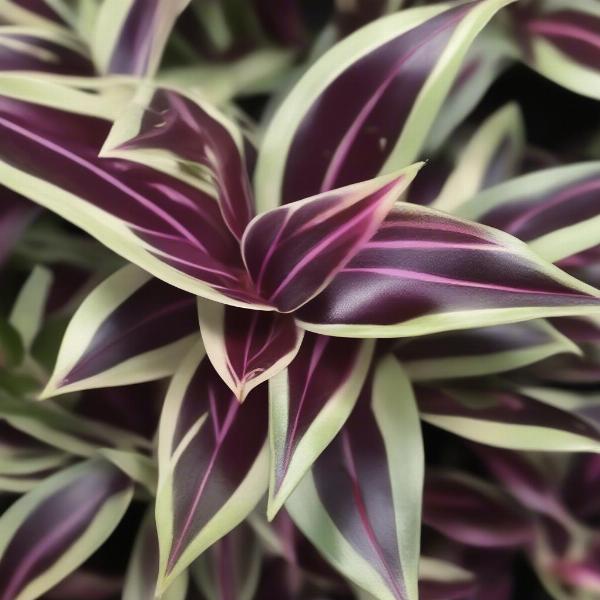Wandering jew plants, with their vibrant foliage, are a common sight in many homes. But if you’re a dog owner, you might be wondering about their safety. This article explores the potential risks of wandering jew plants to dogs, offering practical advice on how to keep your canine companion safe while enjoying the beauty of these popular houseplants. We’ll cover everything from the plant’s toxicity levels to preventative measures and what to do in case of ingestion.
Understanding the Toxicity of Wandering Jew
While not considered highly toxic, wandering jew (Tradescantia zebrina, also known as Tradescantia fluminensis and inch plant) can cause mild to moderate discomfort in dogs if ingested. The plant’s sap contains chemicals that can irritate the skin and mucous membranes, leading to symptoms like drooling, vomiting, and diarrhea. The severity of the reaction depends on the amount of plant material consumed and the individual dog’s sensitivity.
 Wandering Jew Plant
Wandering Jew Plant
Symptoms of Wandering Jew Poisoning in Dogs
If your dog has nibbled on a wandering jew plant, watch out for the following signs:
- Excessive drooling
- Vomiting
- Diarrhea
- Loss of appetite
- Skin irritation, particularly around the mouth and paws
- Pawing at the mouth
It’s important to note that these symptoms can also be indicative of other health issues. If your dog exhibits any of these signs, contact your veterinarian immediately for a proper diagnosis and treatment plan.
Preventing Wandering Jew Exposure in Dogs
The best way to protect your dog from wandering jew toxicity is to prevent access to the plant altogether. Here are some practical strategies:
- Place plants out of reach: Hang your wandering jew in a hanging basket, place it on a high shelf, or in a room inaccessible to your dog.
- Train your dog: Teach your dog a “leave it” command to discourage them from interacting with the plant.
- Provide alternative chewing options: Offer a variety of safe and engaging chew toys to redirect your dog’s attention away from the plant.
- Supervise your dog: When your dog is in areas where you have plants, keep a close eye on them to prevent any nibbling.
What to Do If Your Dog Ingests Wandering Jew
If you suspect your dog has eaten a wandering jew plant, act quickly.
- Remove the plant: Take any remaining plant material away from your dog.
- Assess your dog: Observe your dog for any symptoms of distress or discomfort.
- Contact your veterinarian: Inform your veterinarian that your dog has potentially ingested a wandering jew plant. They will advise you on the best course of action.
- Follow your veterinarian’s instructions: Your veterinarian might recommend bringing your dog in for an examination or suggest monitoring them at home.
Alternative Pet-Friendly Houseplants
If you’re looking for houseplants that pose no threat to your furry friend, consider these options:
- Spider plants
- Prayer plants
- Calathea
- African violets
- Peperomia
Conclusion
While wandering jew isn’t the most toxic plant for dogs, it’s still best to err on the side of caution. By implementing preventive measures and knowing what to do in case of ingestion, you can create a safe and enjoyable environment for both your canine companion and your beloved houseplants. Remember to always contact your veterinarian if you have any concerns about your dog’s health.
FAQs
- Are all types of wandering jew toxic to dogs? All varieties of Tradescantia can cause mild irritation if ingested by dogs.
- Can wandering jew cause long-term health problems in dogs? Ingestion typically only causes mild to moderate gastrointestinal upset, not long-term issues. However, always consult your vet.
- What is the best way to deter my dog from eating my houseplants? Training, providing alternative chewing options, and placing plants out of reach are effective strategies.
- Are there any houseplants that are completely safe for dogs? While many plants are considered non-toxic, it’s always best to prevent dogs from chewing on any houseplants.
- What should I do if my dog vomits after eating a wandering jew plant? Contact your veterinarian immediately for advice.
ILM Dog is a leading international online resource dedicated to providing dog owners worldwide with reliable and practical information on all aspects of dog care and well-being. From breed selection and health care to training, nutrition, and grooming, we offer expert advice to help you nurture a happy and healthy canine companion. We’re passionate about helping you provide the best possible care for your furry friend. For personalized guidance and support, contact us via email at [email protected] or call us at +44 20-3965-8624. Visit ILM Dog for more valuable insights and resources.